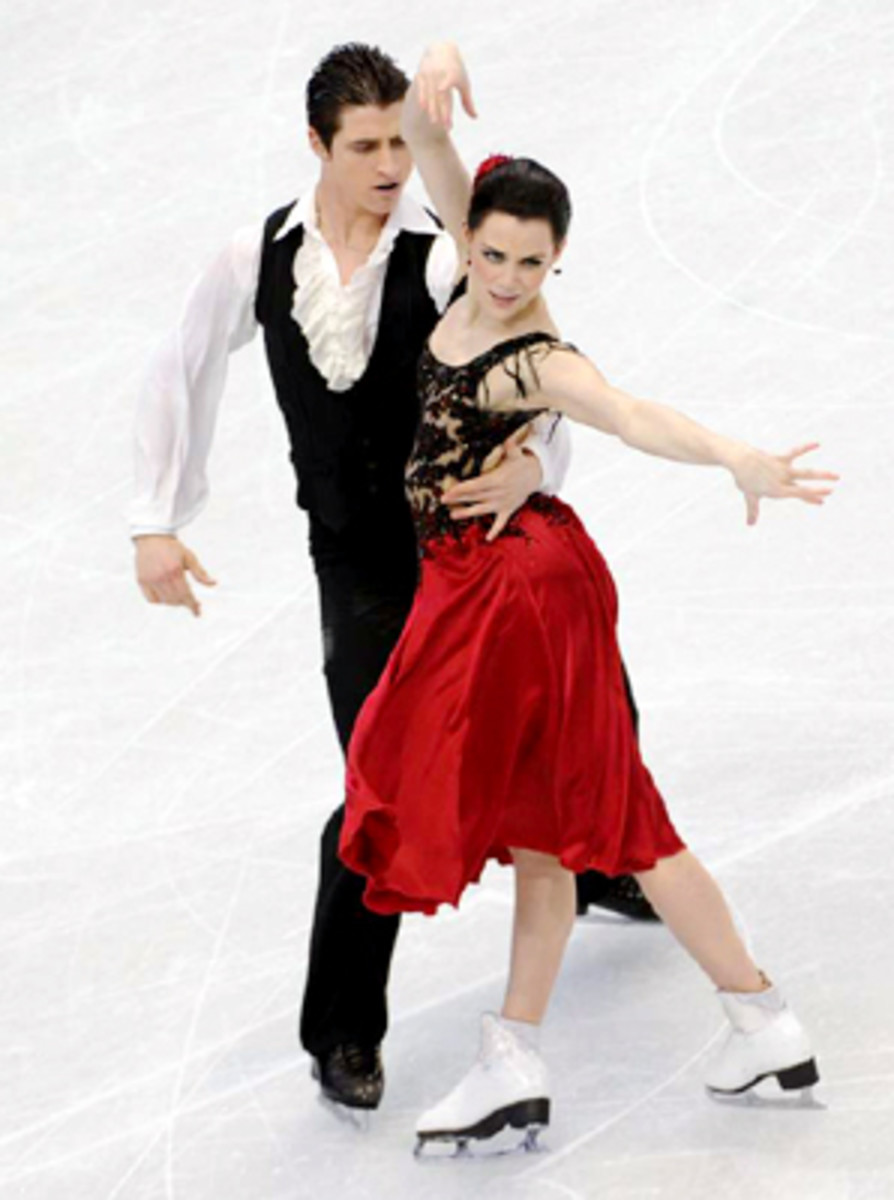This host team didn't disappoint
VANCOUVER, British Columbia -- Just when it appeared the fix was in and the ice dance judges were up to their old political tricks, along came the original dance and all assumptions went flying into the profanity-laced, beer-fueled, tear-stained night.
The tears? The beers? The profanity? Credit Canada's 5-3 loss to the U.S. in hockey earlier in the evening. But the real shocker Sunday night was that the dynamic Canadian ice dance couple of TessaVirtue and ScottMoir shook the Pacific Coliseum with their high-energy Spanish flamenco dance to take a slim lead over Americans MerylDavis and CharlieWhite, and Russians OksanaDomnina and MaximShabalin, who were the leaders after the compulsory dance.
Any of the top three teams can still win it, and the fact that all three changed placements from the compulsory to the original dance gives Monday's free dance a welcome sense of excitement and unpredictability. Sort of like hockey. Asked if he and White had made a wager on the U.S.-Canada game that night, Moir's smile turned to a frown. "We really have to talk about that hockey game now? I had to stop watching it. What was the final, 5-3? Well, the Canadians are still quite a special team and I'm still confident. America hasn't had the last laugh yet. You want my line combinations for tomorrow night?"
Not necessary. Vancouverites, and all Canadians, would be perfectly happy with an ice dancing gold medal. Set a good example for the other boys on the ice.
Domnina and Shabilin had entered the night with a lead of 2.09 points over the Canadians, and a whopping 4.69 points over the Americans, on the strength of their compulsory dance. It was a perfectly fine dance, but few really believed such a margin was legitimately earned. Speculation was that, after the brouhaha raised by the Russian delegation over EvgeniPlushenko's loss to EvanLysacek in the men's competition, the ISU would throw Vladimir Putin's boys a bone by giving them the ice dance title.
Domnina and Shabilin were defending world champions, after all, and even though White and Davis had gone undefeated this season, ice dancing is so difficult to judge and to differentiate at the highest levels, that politics are as often as not the deciding factor in determining champions. The judging panel also seemed to be stacked in the Russians' favor. One of the nine judges was AllaShekhovtsova, the wife of ValentinPiseev, head of the Russian Olympic Federation. Talk about a conflict of interest. Another judge was a woman named IrinaNechkina, who lives in St. Petersburg -- but judges for Ajerbajian. She used to judge for the Soviet Union. And not very well, at that. Nechkina received so many negative assessments four years ago, she was kicked off the judging panel in Torino at the 2006 Olympics. Another judge was a Ukrainian, LudmilaMikhailovskaya, who was voted off the ISU's ice dancing technical committee. Plus, there was no American judge on the panel.
Didn't portend well for Davis and White. The Russians performed their dance first, an aboriginal folk dance that had generated a great deal of negative reaction during the season, since it had been performed in blackface. Sensitive to the criticism, Domnina and Shabalin lost the blackface for the Olympics, but still skated in flesh-colored costumes with a few dollops of paint, ropes and leaves flying everywhere and everything but bones in their mouths. It was truly awful. The music was a combination of grunting and drums and a sound like a package of Skittles spilling across a cherry wood floor. At one point, Shabilin pulled Domnina's blond ponytail. I'm pretty sure it was a mating dance.
Tasteless as it was, they were scored 62.84 points, the highest mark the Russians had received for that dance all season. Aha, the fix was in.
Then came Davis and White. Their dance is an Indian folk dance, and it's been getting rave reviews and high marks all season. Sunday, it offered more of the same: speed, perfect unison, complexity, a touch of whimsy, while still looking like a dance. Their highest mark all season in the original dance was 65.80, and they would need to score in that range to pass the Russians. Then came the shocker: Davis and White earned 67.08 points. "When you're able to skate your best like that, it turns out to be a lot of fun," White said. "It was one of those performances where you come out feeling greater than you did going in."
A roar went up in the stadium. Wonder of wonders, the fix wasn't in after all. It was a real competition. Skating next to last, then, was the Canadian team of Virtue and Moir, who train in the same rink (Detroit SC) and with the same coaches (IgorShpilband and MarinaZoueva) as Davis and White. Moir and White, in fact, are good friends and former youth hockey players, who were once, unbeknownst to them at the time, involved in the same hockey brawl during a tournament in Canada. (White, 22, is from Dearborn, Mich.; Moir, 22, is from London, Ontario.)
Building speed as the program went on, Virtue and Moir skated with energy and passion, drawing the crowd into their performance. For its part, the crowd blew the roof off the barn. "It felt amazing," Tessa said afterward. "It felt like all of Canada was on the ice with us."
The judges, again, didn't disappoint. Virtue and Tessa scored a whopping 68.41 -- 4.41 points higher than they'd ever been awarded for the original dance. They deserved every bit of it. Going into Monday, they lead the Americans by 2.41 and the Russians by 5.13. Americans TanithBelbin and BenjaminAgosto, who won silver in Torino in 2006, stand fourth, 7.82 points back.
• Gold: Virtue and Moir, Canada• Silver: Davis and White, U.S.• Bronze: Domnina and Shabalin, Russia






